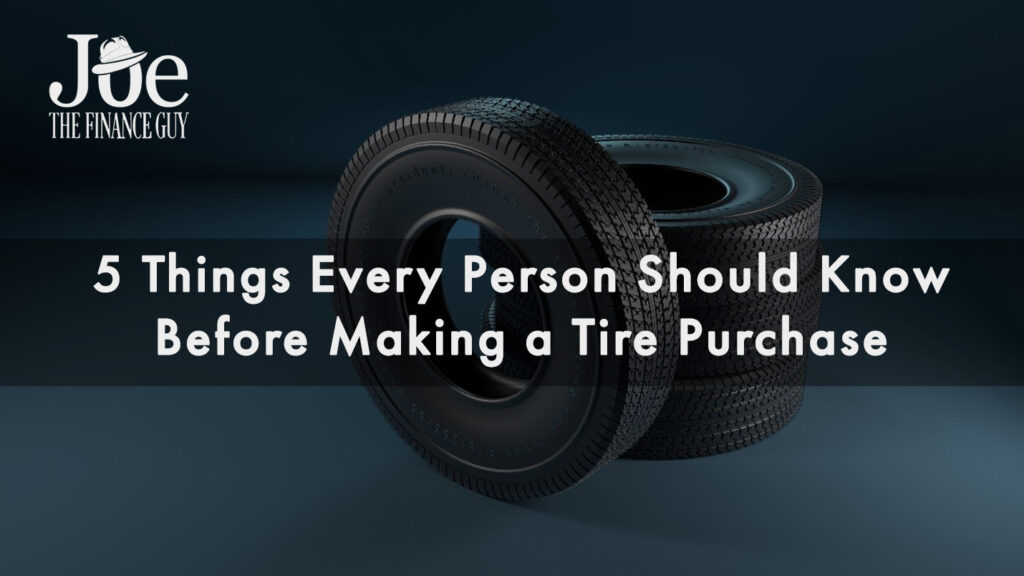Tires are essential parts of your car, and it’s important to get them correctly mounted and inflated according to manufacturer guidelines. But what about all the other factors that go into purchasing a tire? This blog post will look at five things every person should know before making a tire purchase. This article has everything you need to make an informed decision about tires, from the importance of tread depth to the benefits of tire width.
Price
When buying a new tire, there are a few things every person should know before making a purchase. Price is one of those things. Here are some tips on how to get the best deal on your new tires:
- Shop around. There are a lot of different tire brands and models out there, so it’s important to compare prices before making a purchase.
- Be prepared to pay more for branded tires. Many branded tires tend to cost more than their generic counterparts, but that doesn’t mean they’re always worth the extra money. Test drive the tires you’re interested in before purchasing to ensure they fit your vehicle and meet your needs.
- Consider factors such as weight and size when shopping for tires. Heavy or oversized tires will increase your car’s overall price, so be sure to factor that into your decision-making process.
- Get multiple quotes from different dealerships or suppliers. It can be helpful to get numerous quotes so you can get an idea of what each option costs and which is best for your specific needs and budget.
By following these five tips, you’ll be able to make an informed decision when choosing the right tires for your needs.
Longevity
Most people do not realize the importance of properly caring for their tires. You can increase your tires’ lifespan and save money by taking some simple steps. Here are a few tips to keep in mind:
Check the tread depth regularly
If your tires have less than 4/32 inches of tread left, it is time to replace them. 4/32 inches is the minimum legal limit for tread depth in most states.
Don’t drive on bald or deeply worn tires
Driving on these surfaces can cause your tire to wear out sooner and increase your risk of getting a blowout.
Replace your tires every 7,500 miles
This is the recommended interval for most cars and trucks. Over time, driving on worn-out tires will cause them to lose air pressure, impacting your ride and handling ability.
Store tires properly
Keep them inflated at least 30 pounds per tire and out of direct sunlight or extreme temperatures. Extended storage at high pressures can also damage tires over time.
Size
When it comes to tires, size is essential. Not only do different sizes fit different cars, but each size also has unique properties that can affect how a car drives. The smallest tire you can buy for your car will almost always be the cheapest option, but it might not be the best choice for your needs. Here are five things you should know about tire size before buying:
- A car’s weight affects the size of its tires. Bigger cars need bigger tires to handle the extra weight, while smaller cars need smaller tires.
- The type of terrain you’ll be driving on also affects tire size. For example, dry roads call for narrower tires than wet ones because water can cause the rubber to break down prematurely.
- Tires require air pressure to work correctly; too little air pressure and your tires will wear quickly, while too much air pressure can create unsafe conditions on the road. Check your owner’s manual to find out how to check and adjust your air pressure regularly (usually every 3 months). And remember: never drive with flat or low-pressure tires!
- Tires come in various widths that affect how they grip the road. The most popular widths are P-Metals (for SUVs and sedans), all-terrain tires, and city tires. Choosing the correct width for your vehicle is essential so you don’t have to replace your tires too often.
Speed Rating
Every time you get in your car, you rely on the tires to provide a safe and comfortable ride. When it comes to tire purchases, it is essential to understand each tire’s speed rating.
Tires come in different types and sizes, so you must use the correct speed rating for your vehicle. If you don’t know what the speed rating for your car is, there are a few quick ways to find out.
The first way to determine the speed rating is to check the owner’s manual or look online. The second way to determine the speed rating is by using a wheel calculator. Wheel calculators can be found at most convenience stores or automotive retailers. The wheel calculator will list the speed ratings for all of the available tires on your vehicle.
If you still can’t find the necessary information, your local tire dealer can help you determine which tires will fit your vehicle and meet your desired performance requirements.
Driving Needs
Before you buy any tires, you first need to determine what type of driving you will be doing. Will you be primarily driving on flat roads or in mountainous terrain? Will you be driving in cold weather conditions or hot weather conditions? Depending on your answers to these questions, you may need different types of tires suited to your specific needs.
Final Thoughts
There are a few things every person should know before making a tire purchase, as the price can be deceiving. Here are four final thoughts on the topic:
- Always compare prices before making a decision. There is no one “right” price for any tire, so be sure to shop around and find the best deal.
- Consider your needs and wants when choosing a tire. Whether you need a specific size or type of tire or want something that will last long, take time to think about what you need and what you want in a tire.
- Don’t be fooled by inflated prices. While it may be tempting to overspend on tires, remember that they will only last as long as they’re properly cared for – which means getting regular replacements from your dealer.
- Be sure to understand all the terms associated with tires – and don’t be afraid to ask your dealer about them! Knowing the words can help you make an informed decision about which tires are suitable for your vehicle.
Thanks for reading! Find more articles from Joe The Finance Guy here.


